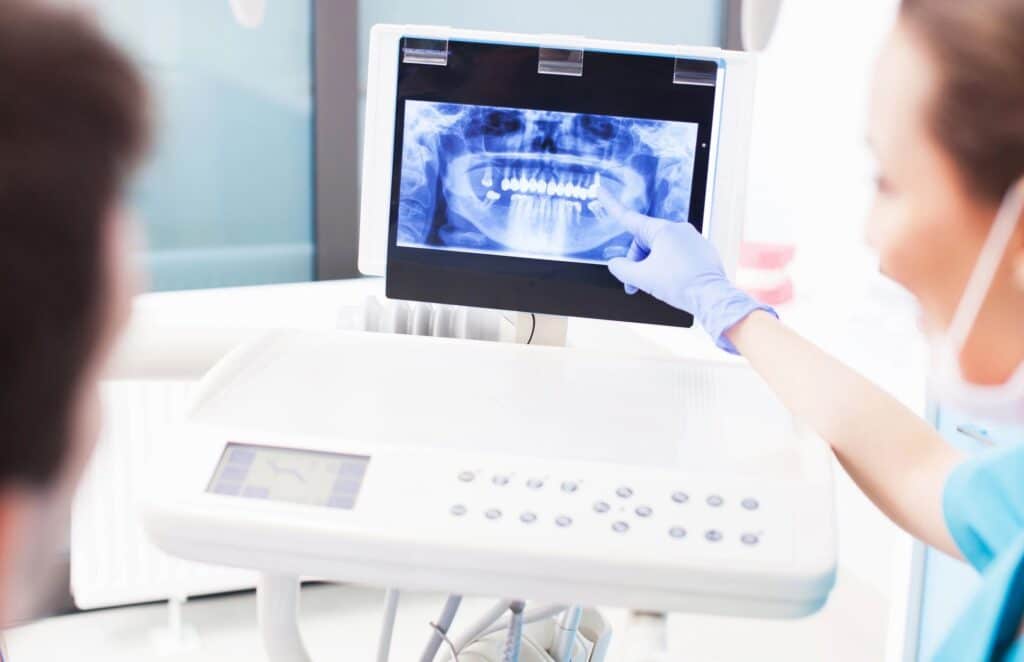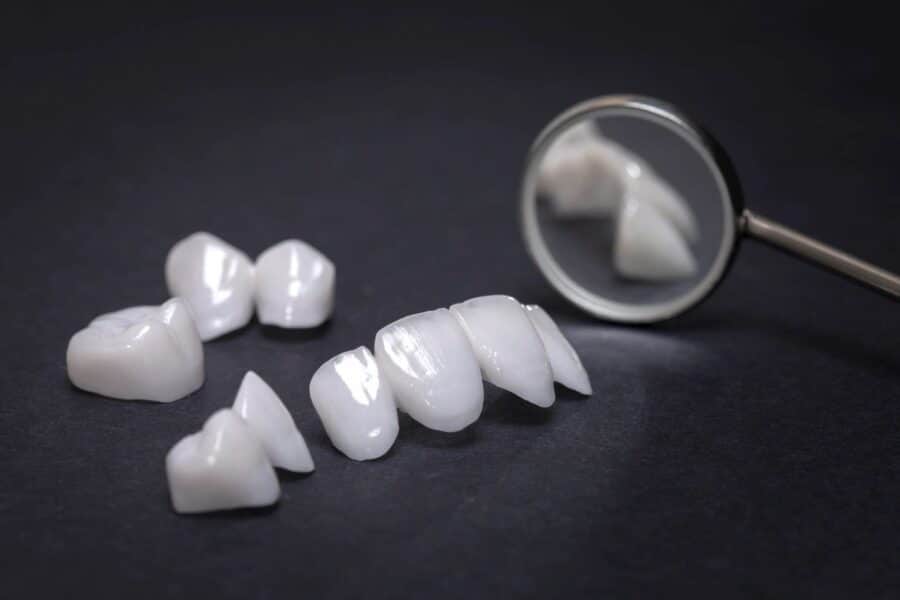Thanks to dental implants, you can now replace missing teeth and have a healthy smile with stable chewing ability.
Dental implants are small titanium posts that are surgically placed within the jawbone. These posts and your bone fuse together, making the implant stable enough to support permanently placed false teeth called dental prosthesis such as crowns, bridges, and over-dentures.
Through careful planning, your periodontist will design an implant treatment plan to meet your needs. This planning involves an initial examination, special digital information like x-rays and models, and consultation that explains the procedure using computer-guided imaging.
Implant treatment involves placement of the implant by the implant surgeon and design and placement of the crown, bridge, or denture by a restorative dentist and dental lab. Because the surgery center has the entire team under one roof, the entire procedure from start to finish is efficiently implemented by the implant team.
Thanks to implant technology, you can replace missing teeth in a way that feels natural and is permanent instead of something that needs to be removed daily.
What Are Common Reasons for Implants?
Implants can replace single missing teeth, can replace multiple teeth by support fixed bridgework, or can support a loose denture by providing a stable attachment.
Implants can replace single teeth that have been lost due to injury, gum disease, or severe tooth decay. The implants act as a base on which your restorative dentist places a lab-designed crown that looks just like your own teeth. Because implants fuse to jawbone like natural tooth roots, they look and feel like natural teeth. They can be cleaned similarly to natural teeth with brushing and flossing.
Multiple missing teeth can also be replaced with implants by using them to fabricate bridgework, which is a prosthetic that is a group of fused crowns that are secured to the implants. Implant-supported bridges can replace as few as two teeth or an entire arch, which means you can finally eliminate removable partials and dentures.
For patients who have dentures that do not fit properly and are loose or uncomfortable when chewing or speaking, implants can help to stabilize them as well. Implant-supported over-dentures are made in coordination with implants to secure together similarly to a ball and socket. Although dentures are removable, they ‘click in’ to the implants when worn so that your denture stays in place and allows for better chewing. Having stable dentures also allows you to speak and laugh without worry.
Your implant surgeon can help you understand and plan which type of implant procedure is best for you.
How are Implants Planned?
Planning is the key to the success of an implant. Your implant surgeon will work with you to design a personalized plan that includes discussing your choices, reviewing your overall health and oral hygiene, and focusing on ways to make your implant procedure more predictable. A more predictable implant procedure allows for less discomfort, faster recovery time, and reduced expense.
What is the Procedure?
Getting your new implant involves several steps in a team effort that includes your implant surgeon, restorative dentist, and dental lab.
In the first step, your implant surgeon plans and implements the surgical placement of the implant titanium post through a carefully planned procedure using information gathered through diagnostic tools and computer guidance. This implant sets the foundation for the crown that will be placed by the restorative dentist.
The next step involves both restorative dentist and the dental lab who work together to design, create, and place the prosthesis over your implant, thus giving you teeth again. They work together to fabricate natural looking teeth that function well in coordination with your existing teeth.
Because implants do not have ligaments like regular tooth roots, there is no pressure sensation like natural teeth. That is why your restorative dentist and lab carefully plan how your new teeth will align with your existing bit to ensure that your bite in even and safe for your natural teeth.
Is the Procedure Painful?
Although any surgical dental procedure has some level of discomfort, thanks for new technology, any pain is minimal compared to past methods.
Using the latest technology and personalized planning, implant placement is now more precise, which means easier for the patient. Using diagnostic tools such as a digital scanner called CBCT and Digital Impressions, your implant surgeon can create an exact plan for your implant procedure on a computer-guided plan. Having the technology that provides personalized precision means less discomfort and quicker recovery when placing implants.
What Technology is Used?
The CBCT scan is a 3-D model of your jawbone on the computer. This helps to plan the exact position that the implant should be placed in relation to your other teeth and other oral anatomy. The 3-D image allows your implant surgeon to design a surgical guide that will allow for exact implant placement. Because the design is so exact, it can sometimes be placed without the need for incisions and sutures (stitches), This precision means an easier procedure, faster recovery, and less expense.

Models of your teeth are created using digital impressions, which are easier than the traditional impressions that were often uncomfortable. These digital impressions are done by using an intra-oral scanner that is fast and easy. This digital model helps to plan the final crown that will be placed on your implant post.
Are there Risks to Implants?
As with any other oral surgery, risks do exist but can be reduced with careful treatment planning. Because of careful review of your medical history and the digital diagnostic planning tools, your implant surgeon can identify potential risks and discuss them with you.
Risks can be identified prior to placing an implant by careful planning considerations. Patients who are smokers or have certain medical conditions and medications should discuss those risks at their consultation.
Rest assured that your implant surgeon will help you understand any risks and ways to prevent them. And your entire dental implant team is here from beginning to end to make sure that you are comfortable and safe.
How Long Do Implants Last?
With proper maintenance, implants can last a lifetime! However, proper maintenance is the key to their longevity. Good oral hygiene and a healthy lifestyle can both help you keep your implants healthy. Follow-up visits with your implant surgeon and/or restorative dentist can also ensure that your implants are staying healthy.
What Else Should I Know?
During follow-ups, your dentist may check your bite to make sure that your teeth align properly with your implants so that your bite is even instead of concentrated. If any changes in your bite exist, your dentist can make proper adjustments.
Since smoking and other tobacco use can contribute to implant failures, your dental professionals can refer you to tobacco cessation programs to help you quit or reduce your tobacco use. In addition, since medical conditions can sometimes affect the health of your implant, it is important that you discuss any changes to your health with your dental professionals.
Good oral hygiene is just as important to your new implants as it is to your natural teeth. While implants cannot decay like teeth, they can be vulnerable to the harmful bacteria that causes gum disease. The way to reduce this risk is to practice good oral hygiene everyday as advised by your dental professional.
Because implant success is a team approach, you and your dental team will work together for implant success. That is why implant maintenance also includes professional dental cleanings and monitoring of the implant on a regular basis.
Together, we can help you achieve the smile that you have always wanted!
